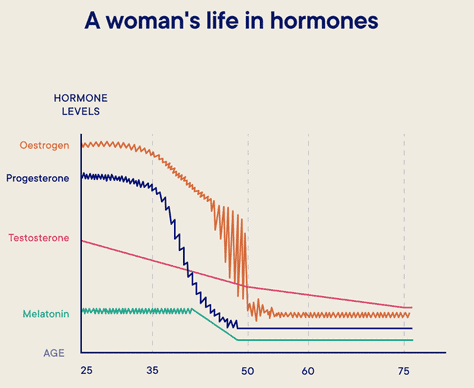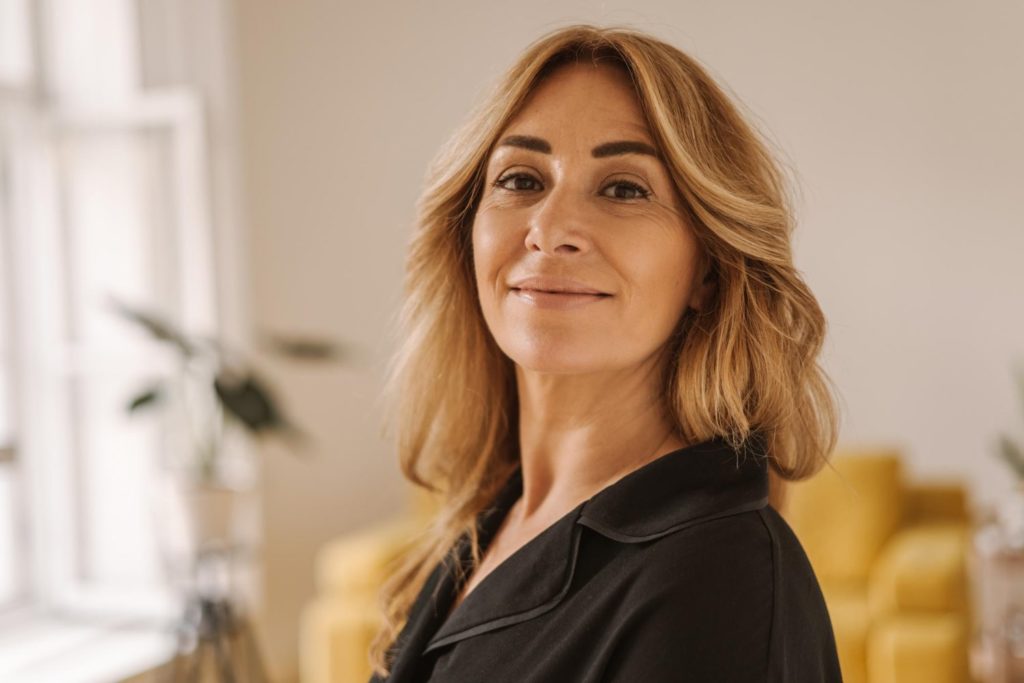
Kàren Maggs
(Midlife and Menopause Coach, Menopause Doula and Certified practitioner My Menopause Transformation)
Western Society does not celebrate or revere the elderly woman. The focus is usually on sexual attractiveness, reproductive capacity and youthfulness. Ageing is often viewed negatively among women and wider society.
Although we’ve been led to believe that it’s all downhill after menopause, it’s actually the beginning of a whole new and exciting cycle.
Western society vs other cultures
In the Western world there is a very strong focus on youthfulness. Once a woman reaches menopause her appearance can change in multiple ways. She often feels invisible in society, and that her contribution and opinion are less relevant than previously.
Backing this idea up are the fairy tales and stories that refer to the elder woman as a witch, a crone or a hag, usually with bad intentions (e.g. the Stepmother in Cinderella, or the Witch in Hansel and Gretel). Overall, Western Society is not one that celebrates or reveres the elder or wise woman.
In an article for the British Psychological Society, the authors said, “In Western societies women tend to be valued for their physical and sexual attractiveness, reproductive capacity and youthfulness. Ageing is often viewed negatively among women and wider society”.[1]
Interestingly, because the messaging around menopause is definitely on the more negative end of the scale, women in Western countries tend to suffer more symptoms and more intensity of symptoms than those in cultures where they revere the elder women.[2]
Studies also show that “Women who perceive their role in life to be of importance – particularly as it relates to family, interpersonal relationships and career – have higher levels of wellbeing, better objective health outcomes and often less intense menopausal symptoms.[3]
In Japan only around 25-50% of women suffer from hot flushes compared to around 75% in women from Western cultures.[4] In fact, until recently, there was no word for hot flush in the Japanese language. Instead it was referred to as kōnenki which means “renewal” and “energy” or “season” and “years”. It indicates that this is a natural life stage rather than a condition to be “fixed”.
RELATED — Menopause: Guide to Signs and Symptoms
In India, menopause is seen as a natural stage of life with many benefits.[5] Chinese women generally experience less hot flashes than Western women and rarely experience embarrassment of their symptoms.[6]
In the Middle East women in postmenopause see it as a time of renewed life, greater inclusion, and higher position in society.[7] Qatari women report it as liberating, more socially active and are able to participate in religious activities that were off limits when menstruating.[8]
Around 75% women from Western cultures experience hot flushes
In a study of First Nations people in America around menopause, some spoke about how it changed their status as they were now seen as ‘wise’ because of their lived experiences.[9]
Today’s Mayan women transition earlier than Western women (around age of 44) and almost symptom free.[10] Even those who do experience symptoms, approached menopause with optimism and a positive attitude about their change in social status.[11]
As Dr. Sandra Thompson explained to Reuters Health, “If menopause symptoms were due solely to hormonal changes then the menopausal experience would be more homogenous”.[12]
All this indicates that our views, cultural and societal beliefs around menopause impact our experience of it. The emphasis in research into menopause has been on the medical aspects of the event as opposed to the psychosocial.
This gives the indication that menopause is something to be fixed or treated whereas much of the experience of menopause is due to the beliefs women hold.
Depletion and the need for nourishment
Given the role of women in today’s society, by the time we arrive at menopause we are often severely depleted in all areas. According to Dr Wendy Sweet, many women turn to more intense fitness pursuits to manage their symptoms. She notes that the “go hard or go home” mantra was actually adversely impacting their symptoms rather than reducing them.[13]
We are asking our bodies to continually give more than they get back. To be successful in a career, women have had to ignore their normal cycles which encourage a time for rest around the time of their monthly cycle, and instead be productive 24/7. We have forgotten to listen to our bodies and instead powered on, resulting in depletion.
What our bodies are calling for during perimenopause and menopause is some nourishment and care, as well as time to rest and adjust, both physically and mentally, to a new way of being.
How Traditional Chinese Medicine might assist
In Traditional Chinese Medicine (TCM), the time after menopause is known as your Second Spring, a time of renewal, rejuvenation and rebirth. It is something to be looked forward to, with revitalised energy and a level of freedom women haven’t experienced before. Freedom from attracting a mate, freedom from monthly cycles, freedom from birthing and raising children.
According to TCM, women’s bodies work in 7 year cycles (as opposed to 8 year cycles for men). At around 2 x 7, we experience our first period (menarche). At around 7 x 7 we experience menopause which is when our body ceases menstruation.[14]
RELATED — 5 Natural Remedies for Menopause
At this point our life force energy moves to the heart “providing a deeper wisdom of herself and the world”. It also provides us with vibrancy and creativity as we enter this second cycle of our life.
TCM also suggests that symptoms we experience throughout perimenopause and menopause are often pre-existing imbalances that need to be addressed. So although we blame it on menopause, in fact it is our life course to date that is causing the symptoms we are now experiencing.
The need for healing before we move forward
Menopause is also a time for healing. It presents us with any unfinished business and raises up areas we thought we had dealt with for a deeper understanding of the lessons they contained. Again, in TCM this is seen as a time to detoxify, reflect on life events and process any trauma.[15]
Jane Hardwicke Collins, a former registered nurse, homebirth midwife and founder of The Shamanic School of Womancraft, says that when women meet in circles or groups and hear other’s stories “They realise that what’s arising for them in their body, mind and emotions are the clues for the inner work they need to do to heal the wounds they carry within from their past and step forward in power and sovereignty into the second half of their lives.”
She also says that menopause is “a healing journey, it has been called the rite of passage designed to heal all the unhealed parts of us”.[16]
The reduction of our nurturing hormone and our sense of self
Combined with our need to undertake our own healing journey is the reduction in oestrogen which is known as the nurturing hormone. It is at its highest in our twenties and peaks right around childbirth.[17]
Oestrogen affects every cell in our body
It encourages us to focus outwardly, to focus on the care and nurturing of others, whether that be children, partners, extended family, friends or pets and other animals.

When our oestrogen reduces, our focus turns inward. It is more about finding our sense of Self as opposed to fulfilling the requirements of others.
As Dr. Suzanne Steinbaum, cardiologist, published author, and women’s wellness advocate says “menopause is the beginning of self care, of self-nurturing, of self-fulfillment”. She goes on to say that whilst you are losing oestrogen that keeps you focused externally, you can now embrace this transition to become who you have really wanted to be all along. It is in menopause that we can focus more on ourselves.”[18]
New opportunities for growth and expansion
Far from being the ‘beginning of the end’, menopause allows us vast opportunities for growth and expansion in ways we have not been able to achieve before. Looking forward to this next phase of our life, as other cultures do, is an important aspect.
Menopause is about reflecting on your life to date and recognising that you have a whole new beginning, a whole new life ahead of you that is different to the life you’ve led until now, so what worked for you before may no longer be applicable now.
As the First Nations Americans say:
“At menarche a girl meets her power, through menstruation she practices her power, at menopause she becomes her power.”
It’s time to have fun and enjoy your freedom. It’s not the beginning of the end – menopause is a whole new beginning just waiting for you to pick up the reins and run with it, wherever that may take you.
Kàren supports women who are juggling the multiple challenges of midlife, managing their perimenopause and menopause symptoms, rediscovering themselves, as well as stepping into their Second Spring (their post menopause years), which is full of excitement, passion and purpose…
If you would like to learn more about Kàren, see Expert: Kàren Maggs.
References
(1) Beverley N. Ayers, Mark J. Forshaw and Myra S. Hunter; (2011); The Menopause; https://www.bps.org.uk/psychologist/menopause
(2) Janelle R Jurgenson, Judith M Katzenellenbogen & Sandra C Thompson. Menopause and the influence of culture: another gap for Indigenous Australian women? https://bmcwomenshealth.biomedcentral.com/articles/10.1186/1472-6874-12-43)
(3) Amanda A Deeks; (2004); Is this menopause?
(4) Johns Hopkins Medicine – Introduction to Menopause; https://www.hopkinsmedicine.org/health/conditions-and-diseases/introduction-to-menopause
(5) Vanita Singh and M. Sivakami; (2020); Normality, Freedom, and Distress: Listening to the Menopausal Experiences of Indian Women of Haryana
(6) Jeanne L Shea; (2020); Menopause and Midlife Aging in Cross-Cultural Perspective: Findings from Ethnographic Research in China.
(7) Linda Smail, Ghufran Jassim, Anam Shakil; (2019); Menopause-Specific Quality of Life among Emirati Women; https://pmc.ncbi.nlm.nih.gov/articles/PMC6981970/
(8) M M Murphy, M A Verjee, A Bener, L M Gerber; (2013): The hopeless age? A qualitative exploration of the experience of menopause in Arab women in Qatar.
(9) Sharen Madden, Natalie St Pierre-Hansen, Len Kelly, Helen Cromarty, Barbara Linkewich, Lauren Payne; (2010); First Nations women’s knowledge of menopause.
(10) M C Martin, J E Block, S D Sanchez, C D Arnaud, Y Beyene; (1993); Menopause without symptoms: the endocrinology of menopause among rural Mayan Indians.
(11) Donna E Stewart; (2003); Menopause in highland Guatemala Mayan women; https://pubmed.ncbi.nlm.nih.gov/12697370/
(12) Lisa Rapaport; (2015); Culture may influence how women experience menopause.
(13) Wendy Sweet; “Nobody talks about it at work, although we are probably all thinking about it.” Working Women, Workplaces and Menopause; https://www.mymenopausetransformation.com/menopause-symptoms/nobody-talks-about-it-at-work-although-we-are-probably-all-thinking-about-it-working-women-workplaces-and-menopause/
(14) A Fingler; (2023); The Second Spring: Menopause in Chinese Medicine; https://acupuncturehealthcalgary.com/the-second-spring-menopause-in-chinese-medicine/
(15) Yasmin Hodge; (2022); Menopause- ‘The Second Spring’ Understanding your treatment options; https://www.yasminhodgeacupuncture.co.uk/post/understanding-the-menopause-the-second-spring
(16) Jane Hardwicke Collings; (2023); My Vision for Menopause; https://janehardwickecollings.com/my-vision-for-menopause/
(17) Hannah Nichols; (2025); Everything you need to know about estrogen; https://www.medicalnewstoday.com/articles/277177#types
(18) Suzanne Steinbaum; (2021); What Makes You Happy?; https://www.drsuzannesteinbaum.com/blog-/what-makes-you-happy-estrogen-changes-that-too






